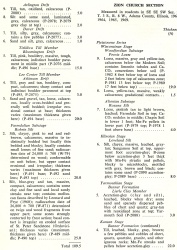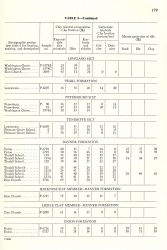Harkness Silt Member
Lithostratigraphy: Banner Formation >>Harkness Silt Member
Chronostratigraphy: Cenozoic Erathem >>Quaternary System >>Pleistocene Series
Primary source
Willman, H. B., and John C. Frye, 1970, Pleistocene Stratigraphy of Illinois: Illinois State Geological Survey Bulletin 94, 204 p.
Contributing author(s)
H. B. Willman and John C. Frye
Name
Original description
Harkness Silt Member, Banner Formation (Willman and Frye 1970).
Derivation
Named for Harkness Creek, Adams County.
Other names
History/background
Type section
Type location
The type section is the Zion Church Section (table 6) 2 miles southeast of Marblehead, SE SE SW Sec. 9, T. 3 S., R. 8 W. At this locality the member is exposed in a roadcut adjacent to a tributary to Harkness Creek and is about 6 feet thick.
| Table 6 -- Stratigraphic Sections (partial) The following 21 stratigraphic sections describe exposures in Illinois and illustrate many of the aspects of Pleistocene stratigraphy. These sections contain the type localities for 21 rock-stratigraphic units, 4 soil-stratigraphic units, and 3 time-stratigraphic units and include paratypes for several other units. The sample numbers preceded by "P" are the numbers used in the Illinois State Geological Survey collections. Analytical data on many of these samples are on file at the Survey. The sections are arrange alphabetically by name. |
Type author(s)
Type status
Reference section
Reference location
Reference author(s)
Reference status
Stratigraphic relationships
It rests on the Afton Soil developed in outwash and it is overlain by till of the Banner Formation of Kansan age.
Extent and thickness
Lithology
It consists of massive, calcareous, gray and tan silt with some fine sand. The mineral composition of the silt (table 5) indicates a northwestern source.
|
Core(s)
Photograph(s)
Contacts
Well log characteristics
Fossils
Age and correlation
The Harkness Silt Member is also present in the Havana region, where it was called early Kansan silt if bedded and pro-Kansan loess if massive and loess-like (Wanless, 1957). Wanless also noted the local presence of leached, dark greenish gray silt overlying bedrock and overlain by Kansan till, or in a few places by Illinoian till. The age of these silts is questionable. They have been called Aftonian or Yarmouthian according to the age of the overlying till. As they generally occupy the position of the Harkness Silt, they are included at present in the Harkness, pending more detailed study and differentiation.
The Harkness Silt Member is early Kansan in age. It originated as a proglacial silt deposited in front of the Kansan glacier advancing from the northwest. The Harkness Silt Member is also present in the Havana region, where it was called early Kansan silt if bedded and pro-Kansan loess if massive and loess-like.
Environments of deposition
Economic importance
Remarks
References
WANLESS, H. R., 1957, Geology and mineral resources of the Beardstown, Glasford, Havana, and Vermont Quadrangles: Illinois Geological Survey Bulletin 82, 233 p.
ISGS Codes
| Stratigraphic Code | Geo Unit Designation |
|---|---|


